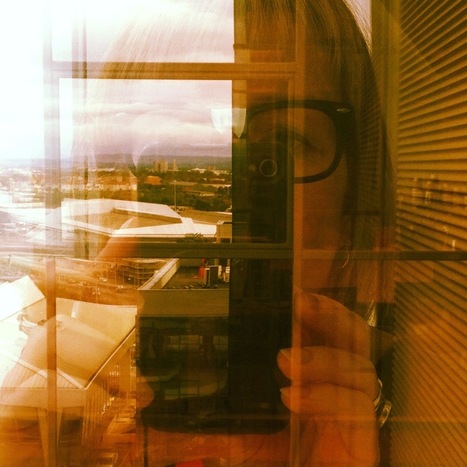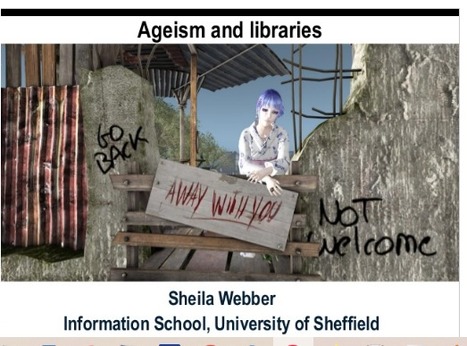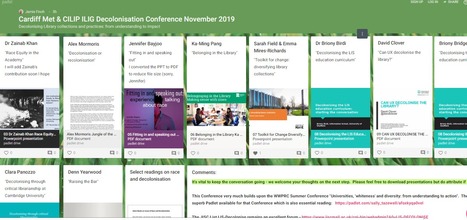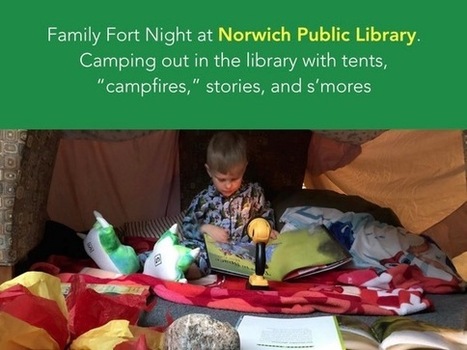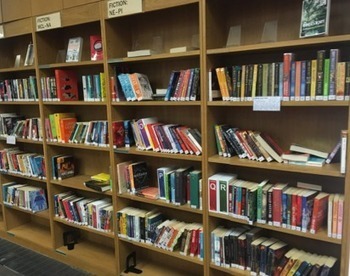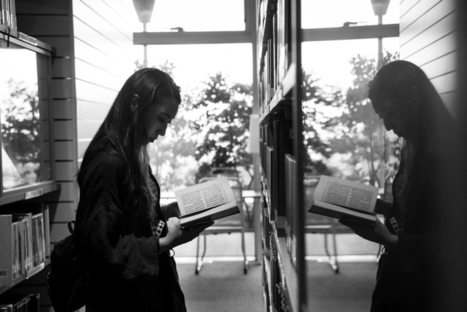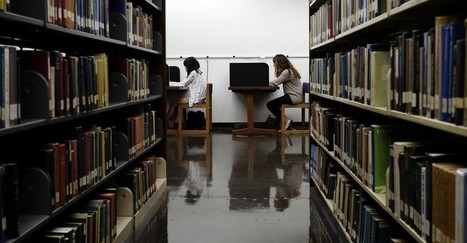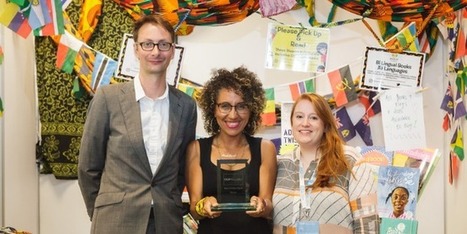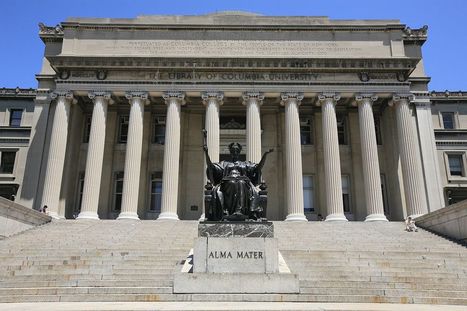Earlier this week I had the pleasure of giving the closing keynote to this year’s CILIPS conference. Like all conferences this year, it changed from a face to face meeting to an online conference. The conference team at CILIPS did a great job moving everything online. I was lucky enough to be able to dip in and out of the conference over the 2 days it ran. It was both inspiring and humbling to see some of the work that delegates shared.
Get Started for FREE
Sign up with Facebook Sign up with X
I don't have a Facebook or a X account

 Your new post is loading... Your new post is loading...
 Your new post is loading... Your new post is loading...
Current selected tag: 'libraries' role'. Clear
Today I gave a presentation on Ageism and libraries at the Critical Approaches to Libraries Conference 2020 (held online). I talked about what ageism was, how the COVID19 crisis has brought ageism more sharply into focus, ageism in the (library) workplace, and ageism in services to library users. These are the slides, and the references are at
From
daisy
In our series of free weekly webinars April 29th saw a session focused on the work of the ASPIRE service which helps publishers and vendors tell the story of the amazing accessibility work they are doing to create a transparent environment for content.
The term ‘decolonizing the curriculum’ is of high currency in higher education in the UK and in local students’ unions at these institutions. This article seeks to give a very brief history and context for why this is fundamental for academic institutions and what role libraries and the scholarly communication sector can play in this movement. I look at why this is so important for black, Asian and minority ethnic (BAME) and othered (otherly minoritized, e.g. disabled, LGBTQ, etc.) students and what steps some libraries have already taken. One of the themes of the UKSG 2019 Conference was ‘diversity and change’; decolonizing the curriculum is exactly that if done correctly. Two presentations from the plenary session provided a good starting point and the article touches on how decolonizing the curriculum may impact research/researchers. It concludes that there is a need for academia to now move past just identifying that there are issues about retention and progression of BAME and othered students and staff, and for both the library and information and scholarly communication sectors to act to address this now.
Elizabeth E Charles's insight:
My article on decolonizing the curriculum, and need for action by librarians, scholarly communication sector and education.
Decolonising Library collections and practices: from understanding to impact
Elizabeth E Charles's insight:
The presentations given at the November 2019 conference at Cardiff Met -great resource on decolonisation and libraries.
Libraries at small colleges, especially colleges with a nontraditional student population, face an uphill struggle to remain relevant in the life of the institution. Students at colleges like these tend to be adults who are already in the workforce and have many responsibilities and demands on their time outside of school. These students will usually either come to campus for their classes and leave or take online classes and rarely set foot on campus.
Several Twin Cities library systems are considering an “open libraries” model that would give patrons access to books, computers and other resources by themselves at times when the library isn’t open and staffed. Two west metro libraries already use the idea on a small scale.
The setup relies on technology — via a central management system — to let people enter the library, check out items and log onto computers — all while video monitors record their actions. There’s a phone connected to a central library or an on-call librarian so patrons can ask questions. Automated systems announce when the library is closing, flick the lights off and on and can even operate amenities like a gas fireplace on a schedule.
The conference Brag Deck is one of my favorite community engagement secret weapons. It’s a slide deck with pictures of things libraries want to show off. It runs on repeat somewhere during the conference, preferably someplace high-profile like over lunch or during a meeting. People can watch it, see what other libraries are doing, get ideas. I make a little web page that goes along with it so it’s available online all year. If you can make slides, operate email, and download images, you can do this. Here’s an example from last year (sorry no ALT text version available yet)
In my role as the library dean I have already been engaged with data-driven student success initiatives. We are still working to implement use of EAB on our campus. The company offers a set of tools that can track grades and registration (OK – we already do that). It also provides functionality that tracks visits to the tutoring center, the health and counseling centers, and can analyze how successful students are when they take specific classes and specific times. If you guessed that faculty are very wary of that last bit of analysis you’d be correct.
Libraries and learning resources services have embraced digital practice over three decades. Lis Parcell reflects on their pioneering approach and considers how libraries will continue to reinvent themselves
There is currently a dearth of research on African American college students and their interactions in academic libraries. The purpose of this quantitative study is to investigate whether African American college students view academic libraries as welcoming places and to identify factors that are most influential in their perceptions of welcomeness. Adopting the theoretical lens of “library in the life of the user,” we administered a national online survey questionnaire to 160 black college students attending non-historically black colleges and universities in the United States. The survey data were analyzed by employing correlation coefficient and multiple regression analysis to test our hypotheses. The analytical results showed that participants felt welcomed in academic libraries, and library as place and information needs were significant factors that affected students’ perceptions of welcomeness. Our findings suggest that library patrons are important actors in constituting the atmospheric character of the library.
Special librarians need to keep our eye on the Internet of Things, since it not only reduces the friction between user and their goals for turning on lightbulbs, meeting with each other, and managing their viewing habits, it’s already a long way into exploring the content universes that they rely on.
While the role of the library has evolved to provide services from internet access to journalism programmes, countless libraries still face closure, as civic leaders fail to recognise the critical social, intellectual, cultural, and economic roles they play |
Christopher Cox predicts the significant ways academic libraries will shift in terms of collections, services, spaces and operations as a result of the pandemic. In early March 2020, COVID-19 blindsided academic libraries. With little time to plan, we closed our library facilities at Clemson University to protect the safety of our patrons and employees and moved to online services only and work from home. Thankfully, years of curating digital content, providing multiple opportunities for research interaction and developing robust search interfaces and web presences served us well during this transition.
Elizabeth E Charles's insight:
A timely reflection on what we have learned in the last months and the possible impact this will have on academic libraries going forward, post lockdown.
“If you build it, they will come”
9.30 - 10.00 Registration 10.00 Welcome and housekeeping 10.15 - 11.00 Group Discussion. 11:00-11:40 Presentation 11.00 - 11.40 Decolonising LSE Collections - Kevin Wilson (London School of Economics) 11.40 - 11.50 Tea break 11:50 - 13:10 Presentations 11.50 - 12.30 Broaden my Bookshelf: working with the University of Huddersfield SU to tackle the attainment gap -…
Elizabeth E Charles's insight:
Presentations at this conference have been uploaded to this site. Event held on 24 January 2020 at Goldsmiths University.
We all have an original nature, with our own authentic wants and needs. We act spontaneously. Then we meet other people. Very soon, who and what we want to become and even who we believe ourselves to be becomes influenced or even defined by others. Such internalised messages can become self-limiting, and the friction between the self-concept imposed from without and a person’s true nature within can be painful and may even result in mental ill-health (Dykes, Postings, Kopp, & Crouch, 2017, p. 179). For repressed groups, such as women and black, Asian and minority ethnicity (BAME) people, the messages received about who a person is and what they should be are often harmful and repressive. These groups are systematically shown that that they do not matter to society, not least through the lack of BAME role models and the abrogation of their cultural heritage. BAME women suffer intersectional repression and are among the hardest hit.
Schools have been on a mission to reinvent campus libraries—even though students just want the basics. Via John Shank
The ACRL Board of Directors recently articulated a new core commitment of our strategic plan, the Plan for Excellence. Along with the association’s core purpose, “[t]o lead academic and research librarians and libraries in advancing learning and scholarship,” and our core organizational values, which include visionary leadership, responsible stewardship of resources, and the values of higher education and intellectual freedom, we have made an explicit commitment to equity, diversity, and inclusion (EDI).
On October 17th, 1989, the Oakland A’s were playing the San Francisco Giants in the World Series, but just as the game was kicking off—the television broadcast cut out. When the signal came back, it was no longer the baseball game. These were the early minutes of the Loma Prieta earthquake, which struck near Santa
From virtual reality to state–of–the–art makerspaces, higher education institutions are bringing digital innovation to a traditional academic hub on campus.
Libraries have long counted up the books on their shelves to show their value. That meant Harvard University’s library (with 18.9-million books) was clearly superior to Duke University’s (with 6.1-million volumes) or University of California at Riverside’s (with a mere 3 million titles).
While I am delighted to be here, I have to admit that I thought long and hard about whether to accept the invitation to speak today. I am aware that we’ve heard a lot of voices like mine, that voices like mine can drown out other people's voices, and that really it is time for me, for us at CILIP to stop speaking and start listening.
In 2017 Columbia Libraries took a closer look at ten of our largest external services, most of them delivered by for-profit vendors, to review the quality of these external web-based services. Web traffic to these services exceeds 7 million page views per year.
According to experts, university libraries are changing—with the exception of one important roleUniversities are seeking ways to innovate and keep up with the changing expectations of students and faculty, and university libraries are no different. Academic libraries are good at adapting as they try to meet students and faculty who learn differently and who have varying expectations for what their university library is. As physical space, available funding, and student needs change, university libraries will have to adapt to meet different needs and campus roles. |



